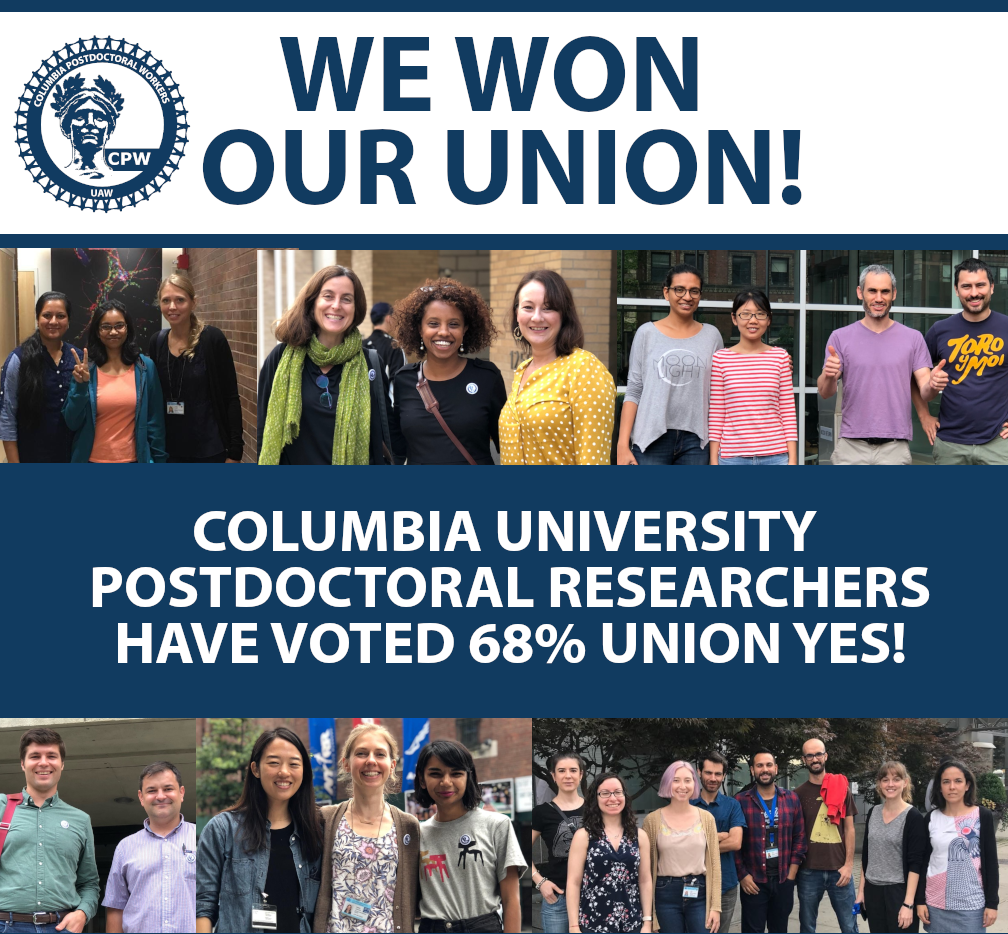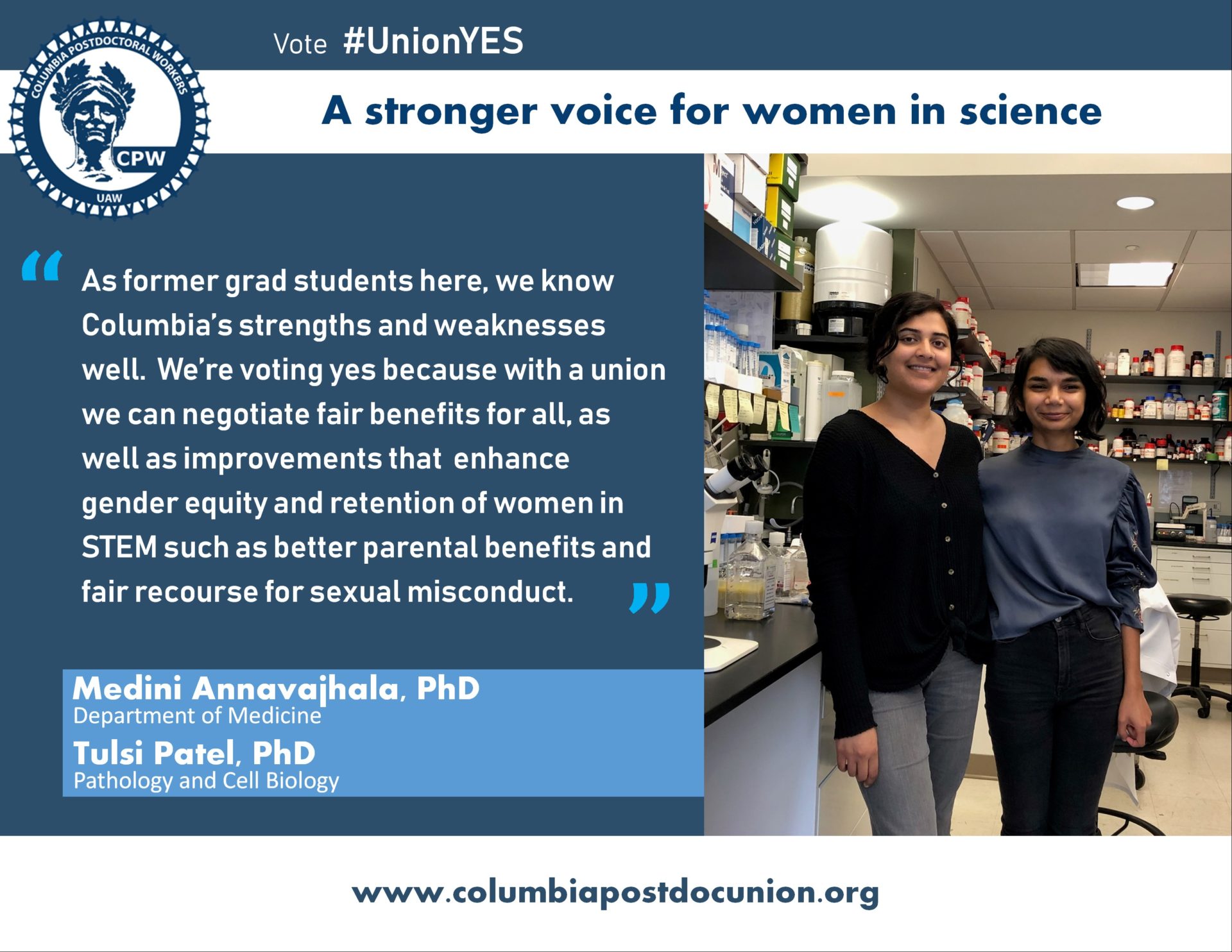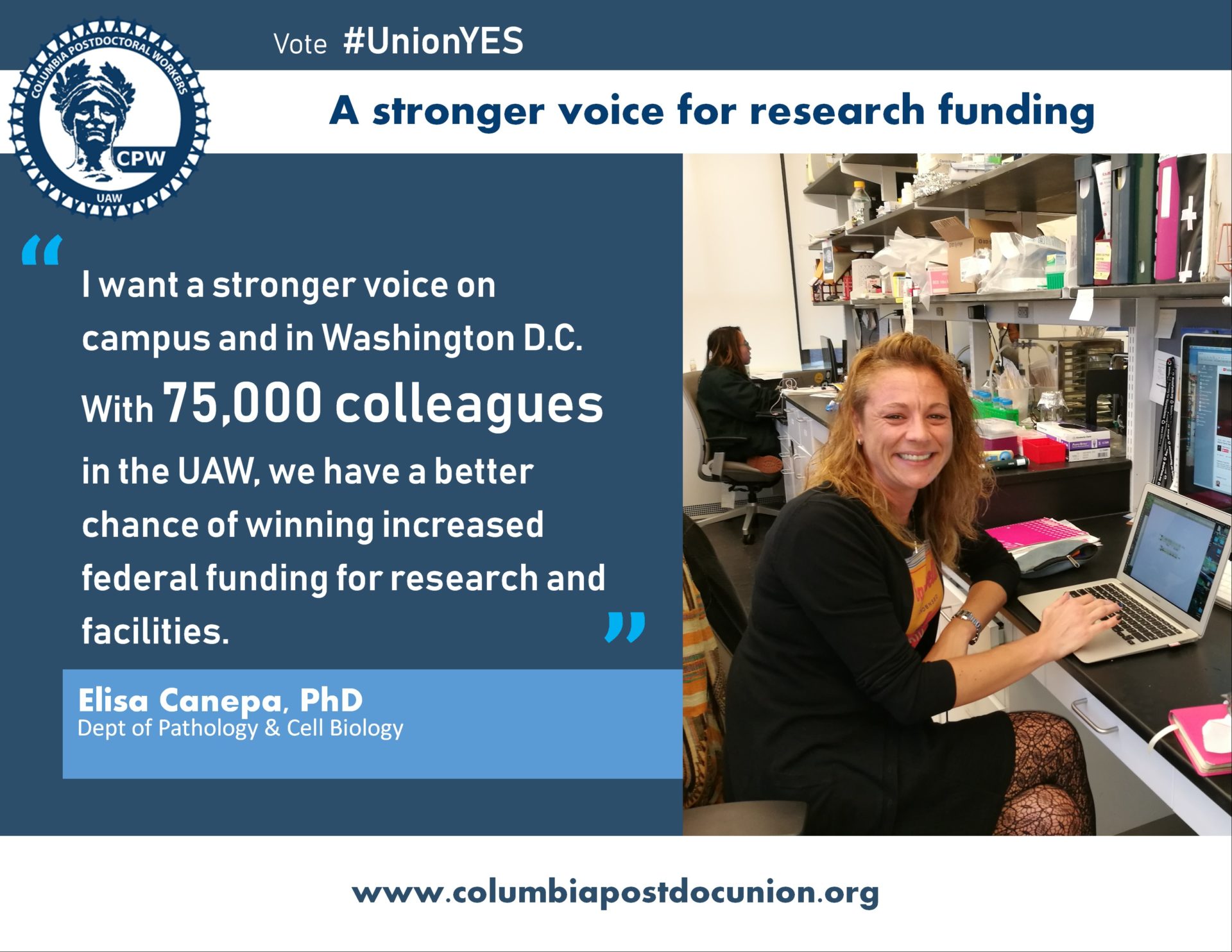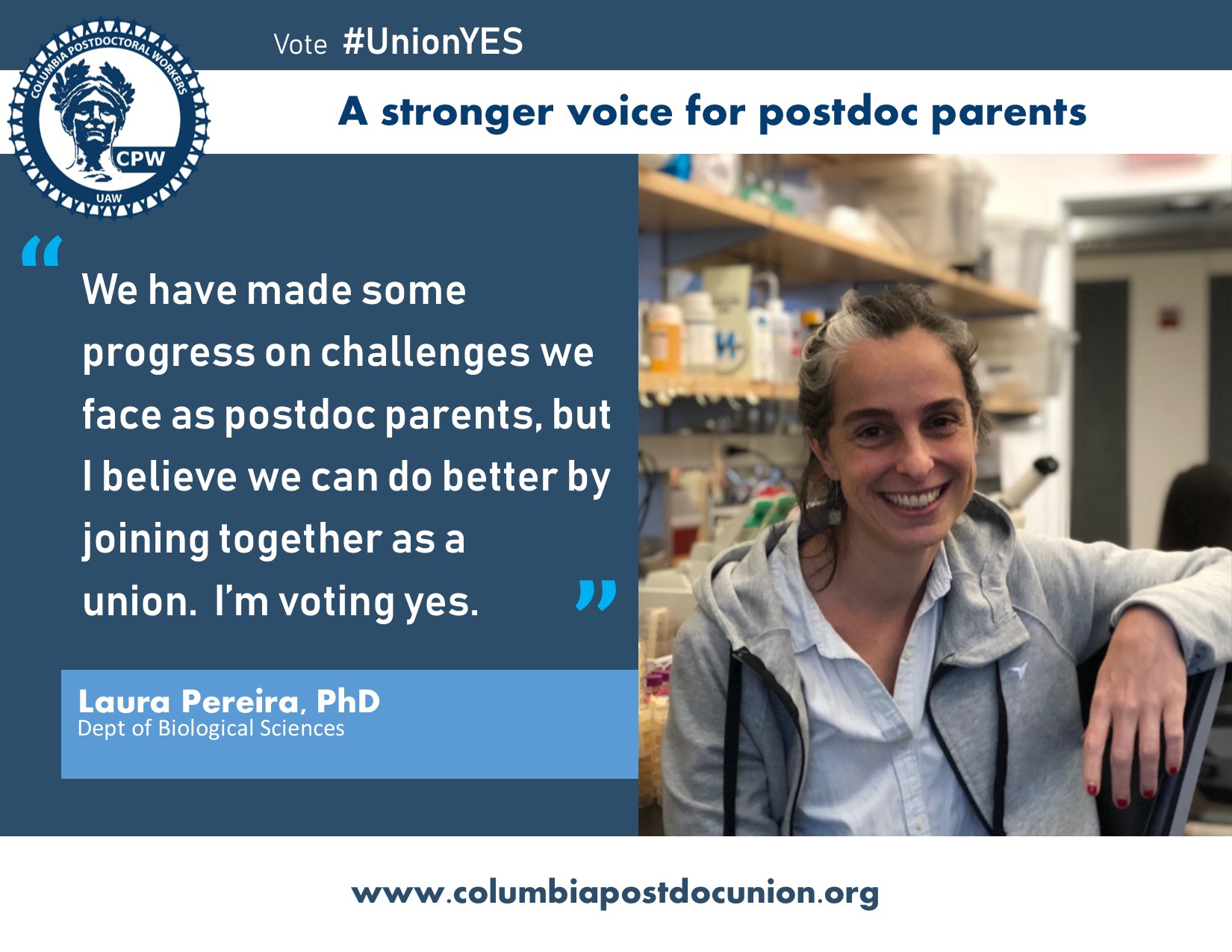Vote on the proposed framework for Bargaining
If you have not received a link to vote please email us at columbiapostdocunion@gmail.com
After more than three years of organizing by postdocs to establish our union, Columbia University has proposed a framework agreement to recognize and bargain with Columbia Postdoctoral Workers-UAW. This proposal would only go into effect if it is voted on and approved by CPW-UAW postdocs and associate research scientists and scholars. You can read the proposed framework agreement here.
The Bargaining Committee unanimously supports this proposed agreement and would like to recommend that CPW-UAW supporters vote “yes.” These are the main reasons why we support the proposed framework:
- The proposed framework provides a clear path toward negotiating a contract with the administration, while agreeing not to strike between now and April 2020.
- The administration will recognize and start bargaining with our union by February 25th, giving us enough time to prepare our bargaining goals and proposals.
- The administration would withdraw its legal action at the National Labor Relations Board to overturn our right to a union, which is currently delaying the beginning of bargaining.
- The administration will also bargain with our graduate employee colleagues, who have been fighting for recognition of their union for almost two years.
- The agreement makes clear that postdoc organizations like CUPS and the Senate will continue to exist in their important functions as advocates on academic and other issues.
- The administration acknowledges that the union “can play a constructive role” in addressing harassment and discrimination, and agrees we can negotiate additional procedures that do not undermine Columbia’s existing processes.
We believe we can generate a strong campaign for a fair contract by April 2020, but reserve the right to take action if the administration does not negotiate in good faith in that time. This proposal by Columbia is a direct result of our overwhelming vote in support of unionization and we encourage all union supporters to vote.
Read the bargaining committee’s summary of the proposal here.
Voting ends on Monday, November 26th, 2018 at 11:59PM EST.
Eligible voters would be Columbia Postdoctoral and Associate Researchers who have signed a CPW-UAW authorization card or filled out our Bargaining Survey and are currently employed by the university in one of the categories outlined by the NLRB decision (i.e. Postdoctoral Research Scientist, Scholar and Fellows, Associate Research Scientist and Scholars). If you meet the above criteria and have not signed up for the Union previously, you may do so here by filling out our Bargaining Survey.

The NLRB just finished counting ballots and we voted by an overwhelming 68% (729-yes to 339-no), in favor of Columbia Postdoctoral Workers-UAW as our union.
We will have more information soon regarding next steps in our campaign. For now, we want to thank everyone who has participated in this historic election and for the last two years leading up to it. Together, we have truly generated an unprecedented discussion of the importance and value of our work as postdocs and associate research scientists.
The more of us who participate in the bargaining survey, the more power we will have to negotiate a strong, representative contract with Columbia.
The voter list includes postdoctoral research scientists/scholars, postdoctoral research fellows, and associate research scientists/scholars. Each voter has been assigned a primary voting location, based on Columbia’s determination of each voter’s physical work location. If you are an eligible voter but vote at a location other than your primary location, you will be allowed to vote at that location, but your vote will be subject to challenge. This is a process that the NLRB follows to verify that people do not vote at more than one location. See more information below about challenged ballots.What if I believe I am eligible, but the NLRB says my vote will be vote will be “subject to challenge”?
“Challenged ballots” are placed in a separate envelope so that questions about the voter can be resolved after the voting is over. There are two general categories of “challenged ballots.”
- Voters on the eligibility list who vote at a location other than their assigned voting location—The NLRB will verify that such individuals did not vote twice and, if the union and University agree, would add them to the ballots to be counted. These ballots are mixed in with the other ballots before the count, so that the confidentiality of the ballot is preserved.
- Other voters may be challenged on the ground that that someone claims they are not eligible to vote. Any voter who is not on the eligibility list will be challenged by the NLRB. Columbia may challenge some of the voters on their list.
| Morningside, Earl Hall 2nd floor Auditorium 10am-2pm, 3pm-7pmCUMC, Hammer Building, Study Hall LL1-104 10am-2pm, 3pm-7pm |
Manhattanville, Jerome L. Greene Science Center Room L7-119, 7th floor 1pm-3pmLamont Doherty, Geoscience Center, Room 113 11am-1pmNevis Laboratory, Irvington, NY, Library 136 Broadway 10am-11am |
| Morningside, Earl Hall 2nd floor Auditorium 10am-2pm, 3pm-7pmCUMC, Hammer Building, Study Hall LL1-104 10am-2pm, 3pm-7pm |
Lamont Doherty, Geoscience Center, Room 113 11am-1pm |
Vote “Yes” for a stronger and more inclusive research community at Columbia
 On October 2 and 3, we have a historic opportunity to establish a stronger voice to negotiate improvements in our working conditions and create a more inclusive research community at Columbia by voting “yes” for CPW-UAW as our union. Joining together with 75,000 other academic workers in the UAW has become more urgent than ever as the Trump administration wages unprecedented attacks on science, sexual harassment protections, and the freedom of international scholars.
On October 2 and 3, we have a historic opportunity to establish a stronger voice to negotiate improvements in our working conditions and create a more inclusive research community at Columbia by voting “yes” for CPW-UAW as our union. Joining together with 75,000 other academic workers in the UAW has become more urgent than ever as the Trump administration wages unprecedented attacks on science, sexual harassment protections, and the freedom of international scholars.
We have a clear choice in this election. Voting “yes” means the Columbia administration would have a legal obligation to negotiate postdoctoral researcher conditions through collective bargaining with CPW-UAW and to secure any agreements on improvements or maintaining current benefits in a binding contract. Without collective bargaining, Columbia administrators far away from our labs decide unilaterally whether, when and how to address problems like the quality and affordability of health benefits for ourselves and our families, whether to offer salary increases that match cost of living or our peers in New York City, uneven enforcement of family leave, or ineffective recourse for sexual harassment, just to name a few examples.
In thousands of conversations, numerous town halls and other meetings, postdoctoral researchers have already identified a long list of issues to address in bargaining—consider the thoughts of our colleagues and these basic reasons to vote “union yes” on October 2 and 3.
Our research community does better when we join together
We have already benefited from the growing movement of academic workers organizing across the United States. For example, after years of unpredictable and insufficient pay increases, the one significant pay increase we received in recent years came not from Columbia’s leadership, but from concerted efforts by UC postdocs and others to create new US Department of Labor regulations mandating higher salaries for all US postdocs. Important progress, but we can still do better—Columbia’s current minimum postdoc salary of $50,123 still lags 17% behind the new $58,661 minimum at Mt. Sinai. With a union, we would have a better chance at negotiating fair compensation that reflects our value and keeps pace with the unusually high cost of living in NYC.
University of California postdocs have negotiated the highest pay of any public university postdocs
See the positive results of collective bargaining for other UAW academic workers
Columbia graduate workers win fully-paid dependent health insurance
The UAW provides a stronger political voice on issues that matter to us as scholars and scientists
UAW Members across NYC – Columbia and MoMA to NYU and Legal Services – reach out to say “union YES!”
With 75,000 academic workers across the US, including postdocs, RAs and TAs, and non-tenure-track faculty, the UAW nationally and locally has become a leading voice advocating for expanded opportunities for international students to work in the US after graduation and for robust federal investment in science research. The UAW also played a key role, alongside others like NIH director Frances Collins, supporting the new federal overtime rules that established significant improvements to postdoc salaries. Here on Columbia’s campus the GWC International Students Working Group has fought for years on Columbia’s campus to protect international student employees from wrongful termination, tax errors, unfair international student fees and the Trump administration’s travel ban. The UAW’s commitment to international students and scholars stems from the leadership of international students and scholars themselves. Postdoc and graduate employee unions affiliated with UAW are often lead by international students and scholars, who serve in top leadership positions in local unions nationwide.
Letter to the editor: UAW is a strong ally for international students and postdocs
Read about UC postdoc and UAW efforts to support federal science funding
As International Researchers at Columbia University we are voting Yes for our Union
Improved and secure conditions enable postdoctoral researchers to prioritize research
 We all care deeply about our research, which is why we came to Columbia in the first place. However, too many postdocs report problems exercising policies that supposedly exist, such as maternity leave, childcare subsidies, protections against sexual harassment and workplace discrimination, timely reimbursement of work-related expenses, or managing our finances given the gaps in our health insurance coverage. This kind of unpredictability and the lack of clear, effective and efficient recourse get in the way of focusing on our research. The clarity, predictability and security of a contract will enable us to make sure that we can focus our energy on quality research.
We all care deeply about our research, which is why we came to Columbia in the first place. However, too many postdocs report problems exercising policies that supposedly exist, such as maternity leave, childcare subsidies, protections against sexual harassment and workplace discrimination, timely reimbursement of work-related expenses, or managing our finances given the gaps in our health insurance coverage. This kind of unpredictability and the lack of clear, effective and efficient recourse get in the way of focusing on our research. The clarity, predictability and security of a contract will enable us to make sure that we can focus our energy on quality research.
UW graduate workers address problems effectively and efficiently through their Union
Unionized graduate assistant takes on sexual harassment and preserves her academic career
Improved postdoc conditions can enhance postdoctoral researcher career development
 After seven years of unionization, a Rutgers dean refuted previous fears that unionization would lead to fewer postdoc positions or damage relationships between faculty and postdocs, saying in a recent Inside Higher Ed article that “this relationship has turned out to be a very good one for us.” In fact, as he reports, the University not only continues to hire at least as many postdocs as before, but the postdoctoral affairs office has more time to help postdocs with professional and career services because they spend less time on employment issues now clarified in the union contract. The number of postdocs at the University of California has also grown since they first unionized in 2008.
After seven years of unionization, a Rutgers dean refuted previous fears that unionization would lead to fewer postdoc positions or damage relationships between faculty and postdocs, saying in a recent Inside Higher Ed article that “this relationship has turned out to be a very good one for us.” In fact, as he reports, the University not only continues to hire at least as many postdocs as before, but the postdoctoral affairs office has more time to help postdocs with professional and career services because they spend less time on employment issues now clarified in the union contract. The number of postdocs at the University of California has also grown since they first unionized in 2008.
Read about the growth of postdoc unions in Inside Higher Ed
Read about all the improvements UC postdocs have negotiated to improve and stabilize their work
Collective bargaining can help create a more inclusive and accessible university
 Inequalities–including those based on gender, race and immigration status–continue to create barriers for many of the most talented to enter the academic and scientific workforce. And existing systems of recourse for problems like sexual harassment too often fail and can take years. Though much work remains to be done, postdocs, graduate students and adjunct faculty in the UAW have helped make progress on many of these issues, both at the bargaining table and in policy advocacy through the union. At the University of Connecticut, for example, a graduate assistant worked with her union to successfully resolve a major sexual assault and harassment complaint in three months, whereas it has literally taken decades for complaints to be addressed at Columbia.
Inequalities–including those based on gender, race and immigration status–continue to create barriers for many of the most talented to enter the academic and scientific workforce. And existing systems of recourse for problems like sexual harassment too often fail and can take years. Though much work remains to be done, postdocs, graduate students and adjunct faculty in the UAW have helped make progress on many of these issues, both at the bargaining table and in policy advocacy through the union. At the University of Connecticut, for example, a graduate assistant worked with her union to successfully resolve a major sexual assault and harassment complaint in three months, whereas it has literally taken decades for complaints to be addressed at Columbia.
UConn Graduate Student Union Helps Handle Sexual Harassment
“The Silence Surrounding Sexual harassment in Labs at Columbia”
Why we are voting union “YES” for a more family-friendly research community
Why we are voting yes for a more family friendly research community
We are excited to vote yes for our union on October 2nd and 3rd!
Columbia Postdoctoral Workers (CPW-UAW)
But our lack of a real voice with the central Columbia administration means people far away from our labs and offices can decide unilaterally whether we receive fair salaries that match the high cost of living and housing in New York City, or whether we have fair recourse on issues such as sexual harassment, bullying and discrimination. This lack of a voice creates uncertainty that hinders our ability to focus on quality research and has allowed Columbia to offer compensation that falls behind other NYC research institutions.
If a majority of us vote “yes” for our union, Columbia administrators would be legally obligated to negotiate postdoc conditions with our elected bargaining committee and to commit any agreements we reach, regarding improvements or maintaining current benefits, into a binding contract.
We would join thousands of other academic workers who have chosen to affiliate with the UAW to not only to make improvements in their workplace, but also to have a stronger political voice nationally to advocate for important issues like expanding federal science funding and immigrant rights. Unionization of postdoctoral researchers has resulted in tangible improvements at many research universities. Postdocs at the University of California have had a union for over 10 years and most recently the postdocs at the University of Washington and University of Connecticut have formed unions and started bargaining.
We, the undersigned urge our colleagues to participate in our historic election and vote ‘yes’ to certify CPW-UAW as our union so we can work together to bargain a fair contract with Columbia.
Thanassis Dovas, Pathology and Cell Biology
Mark Olabarria, Pathology and Cell Biology
Ioan Filip, Systems Biology
Tomas Aparicio, Institute for Cancer Genetics
Marissa Rashkovan, Institute for Cancer Genetics
Emilia Laura Munteanu, Herbert Irving Comprehensive Cancer Center
Nichole Danzl, Medicine – Immunology
Agnieszka Wendorff, Institute for Cancer Genetics
Jorge Postigo Fernandez, Medicine – Immunology
Silvia Affo, Medicine – Digestive and Liver Diseases
Aveline Filliol, Medicine – Digestive and Liver Diseases
Theresa Swayne, Herbert Irving Comprehensive Cancer Center
Gorka Lasso Cabrera, Systems Biology
Davide Marotta, Medicine – Pulmonary
Ajaneyulu Murari, Physiology and Cellular Biophysics
Uchenna Unachuwu, Anesthesiology
Elena Bianchetti, Pathology and Cell Biology
Francesca La Carpia, Pathology and Cell Biology
Sonya Hanson, Biochemistry and Molecular Physics
Pablo Pérez, Institute for Cancer Genetics
Silvia Alvarez, Institute for Cancer Genetics
Laura Pereira, Biological Sciences
Steven Cook, Biological Sciences
Adriane Otopalik, Biological Sciences
Abhishek Bhattacharya, Biological Sciences
Merly Vogt, Biological Sciences
Eduardo Leyva, Biological Sciences
Berta Vidal, Biological Sciences
Chunmin Shan, Biological Sciences
Onur Cakmak, Biological Sciences
Kristi Stringer, Social Work
Slavko Bogdanov, Astrophysics
Guillaume Plante, Astrophysics
Leo McGilly, Physics
Matt Yankowitz, Physics
Ruth Angus, Astro
Krishna Jayant, EEE
Daniel Rhodes, Mechanical Engineering
Reka Letso-Recinos, Biological Sciences
Haosheng Sun, Biological Sciences
Rafael Tapia-Rojo, Biological Sciences
Alvaro Alonso-Caballero, Biological Sciences
Gulika Reddy, Law
Anjli Parrin, Law
Rahma Hussain, Law
Carlos Forsythe, Physics
Fabian Munoz Silva, Zuckerman Institute
Nabil Daddaoua, Zuckerman Institute
Laureline Logiaco, Zuckerman Institute
Andrew Zaharia, Zuckerman Institute
Laureline Josset, Columbia Water Center
Utsav Dave, Electrical Engineering
Anindya Swarnakar, Chemistry
Elizabeth Heitkemper, Biomedical Informatics
Tzong-Shiue Yu, Pediatrics – Critical Care
Mohammad Islam, Medicine – Pulmonary
Galina Gusarova, Medicine – Pulmonary
Ignacio Hernandez-Morato, Otolaryngology Head and Neck Surgery
Carmen de Sena Tomás( Pediatrics – Cardiology
Huimin Kang, Pediatrics – Nephrology
Sebastián Riquelme, Pediatrics – Infectious Diseases
Partha Patra, Earth and Environmental Engineering
Irina Chernyshova, Earth and Environmental Engineering
Ashley Okwuosa, Journalism
Daniel Nelson, Journalism
Jia Li, Physics
David Tsai, Electrical Engineering
Medini Annavajhala, Medicine
Evan Paull, Systems Biology
Rebecca Kehm, Epidemiology
Nur Zeinomar, Epidemiology
Thomas Yager, Epidemiology
Yoonhee Lee, Electrical Engineering
Benjamin Hoffman, Law
Tulsi Patel, Pathology and Cell Biology
Marta Galán-Diez, Physiology and Cellular Biophysics
Panos Oikonomou, Systems Biology
Alvaro Cuesta-Domínguez, Physiology and Cellular Biophysics
Marcello Ziosi, Neurology – Neuromuscular Medicine
Jananan Pathmanathan, Biochemistry and Molecular Physics
Manu Vanaerschot, Microbiology and Immunology
Kathryn Wicht, Microbiology and Immunology
John Okombo, Microbiology and Immunology
Nina Gnadig, Microbiology and Immunology
Yiyin Zhou, Electrical Engineering
Masaaki Tomii, Physics
Austin Joyce, Physics
Alice Mosberger, Zuckerman Institute
Tal Golan, Zuckerman Institute
Youngkyu Kim, Biological Sciences
Kalpita Karan, Psychiatry
Sebnem N. Tuncdemir, Psychiatry – Integrative Neuroscience
Rebuma Eirdessa Fite, Medicine – Immunology
Debanjana Chatterjee, Medicine – Nephrology
Roxanna Guichon Rubinstein, Dental Medicine
Francesco Brundu, Systems Biology
Albert Serra Cardinals
Jorge Montesinos, Neurology – Neuromuscular Medicine
Georgia Ntermentzaki, Pathology and Cell Biology
Vartika Mishra, Pathology and Cell Biology
Delfina Larrea, Neurology – Neuromuscular Medicine
Mónica Pujol Canadell, Center for Radiological Research
Florence Borot, Medicine – Hematology and Oncology
Maja Milanovic, Institute for Cancer Genetics
Zunaira Shuja, Physiology and Cellular Biophysics
Araitz Alberdi Gonzalez, Physiology and Cellular Biophysics
Amir Momen-Roknabadi, Systems Biology
Dario Sirabella, Columbia Stem Cell Initiative
Giacomo Parisi, Physiology and Cellular Biophysics
H. Tomas Rube, Biological Sciences
Gabby Landsverk, Journalism
Nadia Nguyen, HIV Center
Adam Gerber, Anesthesiology
Dario Martelli, Mechanical Engineering
Khuram Ashraf, Physiology
Rosemary Cater, Physiology
Soledad Domínguez, Medicine – Institute for Genomic Medicine
Juan Mauricio Garre, Department of Anesthesiology
